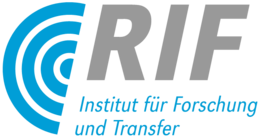PrOPPlan
Operative Produktionsprogrammplanung durch selbstoptimierende Materialflusssimulation mittels Reinforcement Learning (Projektbearbeitung erfolgt durch RIF e.V., Abteilung Produktionssysteme)
Problem
The central task of operational production programme planning (PPP) is the creation of the production programme, which determines which products are manufactured in which quantities and in which time periods. Any production-related aspects that arise are typically addressed in a sequential order and using the expertise of human planners. This results in suboptimal solutions due to consecutive planning assumptions as well as recurring expenses for new and adaptation planning due to variability-related influences.
From a scientific and technical perspective, the combined use of material flow simulations (MFS) and machine learning methods enables the automation of operational PPP with regard to concurrent target variables.
Objective
For originally human-centred tasks of operational PPP, a methodology for generating recommendations for an optimal solution of coherent planning tasks is developed with the help of discrete-event MFS and the possibilities of artificial intelligence and in particular reinforcement learning (RL) that have emerged in the past decade. Specifically, the creation of ideal production programme plans is examined, for which the integrated solution of sequence planning, lot size calculation, detailed scheduling and order release using intelligent algorithms is considered. The methodology will be developed for scenarios of the project support committee, generalised for further use and transferred into a user-friendly IT tool for the simple use of RL techniques during and after the project.
Approach
The systematic solution approach in the PrOPPlan project is based on five working hypotheses:
- Operational PPP tasks must be solved simultaneously in order to take concurring target variables into account
- By adapting RL algorithms and linking them with MFS, the planning activities of operational PPP can be solved with less effort and higher planning quality
- Generalisation of characteristic MFS simplifies the process of future modelling
- By means of comprehensible and transparent model recommendations, utilisation readiness of the developed solution is ensured
- By implementing the methodology in an IT tool, SMEs can apply RL techniques without prior knowledge, which reduces reservations and barriers to data generation, preparation and processing.
Research, Development and Application Partners
Funding Reference
The research project ‘PrOPPlan’ is funded by the Federal Ministry of Economics and Climate Protection (BMWK) under project no. 23010 N / 1 of the Bundesvereinigung Logistik e.V. on the basis of a resolution of the German Bundestag as part of the programme for the promotion of joint industrial research (IGF).


![[Translate to English:] [Translate to English:]](/storages/zentraler_bilderpool/_processed_/2/6/csm_Altes_Maschinenbau-Gebaeude_3a1a87015a.jpg)









